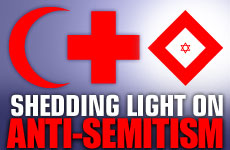 Vampire Weekend's Surprising Jewish Stories
Vampire Weekend's Surprising Jewish Stories


4 min read
3 min read
7 min read
5 min read
Chanukah's uncomfortable message.
Recent events -- like the president of Iran's call for Israel's destruction (and then, apparently in a more kindly mood, for its relocation to Europe); the United Nations secretary-general's participation in a UN-sponsored "Day of Solidarity with the Palestinian People" next to a map showing "Palestine" in place of Israel; the sudden appearance of anti-Semitism in one country (Peru) and the refusal of another (Syria) to permit a Jewish journalist (WorldNetDaily's Aaron Klein) entry because of his ethnicity -- are timely things to ponder as we head toward Chanukah.
Nor should we leave out the ugly underbelly of even some recent "good news," the International Red Cross's vote (after years of haggling, and with only 27 nays and 10 abstentions) to add a new official symbol to the cross and the crescent, entitling Israel's volunteer emergency services to be protected from attack outside the borders of the Jewish State.
Good news, yes. But the new symbol is not the all-too-familiar-to-Israelis "Red Magen David" but rather a red square standing on one corner. A star may be added to the square, but so can a unicorn or a turnip; the stand-alone star of Israel's emergency responders will continue to afford no international protection to vehicles or personnel displaying it. Even, it seems, when Jews are let in the club, they must check their identities at the door.
To understand what all the above "spirit of the season" has to do with the Jewish time of year, one has to move beyond bemoaning anti-Semitism, toward understanding it.
It's not an easy task. Irrational Jew-hatred's astounding resiliency and its purveyors' impressive creativity are baffling. And anti-Semitism has been around for centuries, indeed millennia. So, too, though, has been Jewish tradition's take on the matter.
Classical Jewish thought's approach to the question of anti-Semitism may have been most pithily rendered by the renowned Rabbi Yosef Ber Soloveitchik of Brisk (1820-1892), who wrote: "Know that the more that Jews minimize the ‘apartness' that the Torah mandates through Torah study and the observance of the commandments, the more God allows hatred [within others] to bring about the necessary outcome -- that the Jewish people remain a people apart."
It says much about how far we Jews have drifted from the fundamentals of our spiritual heritage that such a thought strikes so many as outrageous. How, they ask, could our attempt to blend harmoniously into larger society and to jettison religious observances increase anti-Semitism?
Much as we may squirm, we Jews are meant to be "a people apart."
Yet that is precisely what the Torah itself repeatedly and explicitly predicts (as in Leviticus 26 and Deuteronomy 28), what authentic Jewish religious leaders have always maintained, and what alone explains the reality around us. Once our initial umbrage at the idea subsides, what remains are the troubling but telling facts: Despite the Holocaust, and compulsory education in liberal values, and interfaith efforts, and Jews' hearty embrace of the cultures in which they live -- we are as hated as ever. Perhaps more than ever.
That is the point. Much as we may squirm, we Jews are meant to be "a people apart." And if we try to be "just like all the nations," in the Torah's disapproving words, God allows others to remind us of our role.
Which brings us to Chanukah.
Some contemporary Jewish writers -- even, sadly, some clergy -- seem intent on minimizing the significance of the Jewish holiday of lights, claiming it is but a minor affair, artificially magnified by its proximity in the calendar to non-Jewish celebratory days. Nothing could be more misleading. Chanukah, to be sure, is not a Biblical holiday; it is based on an historical occurrence that took place after Biblical times. But it is the focus of a substantial amount of Jewish thought and lore, particularly in the mystical tradition.
What motivates the would-be Chanukah-diminishers, I suspect, is their discomfort with Chanukah's elemental message.
Because according to Jewish tradition, the victory celebrated on Chanukah was only superficially about the routing of the Greek-Syrian Seleucid Empire's forces from Judea. More essentially, it was about the routing of the Greek assimilationist inroads into Jewish life. To the rabbis who established the holiday, a greater enemy than the flesh-and-blood forces that had defiled the Holy Temple was the adoption by Jews of Hellenistic ideals.
For the Seleucids not only forbade observance of the Sabbath, circumcision, Jewish modesty and the study of Torah, they convinced some Jews to embrace their world-view. They installed not only a statue of Zeus in the Temple, but an assimilationist attitude in Jewish hearts. And Chanukah stands for the uprooting of that attitude, for the recognition that Jews are, and must be, different.
Which is why Chanukah's observance does not involve a special feast -- as does Purim's, when the threat against us was physical -- but rather only the lighting, and gazing at, the ethereal light of candles. The battle of Chanukah was, in its essence, a spiritual one. Light represents Torah. And Torah -- its study and its observance -- is the essence of the Jewish people. "A bit of light," as the rabbis of the Talmud put it, "banishes much darkness."
And so, as we light the Chanukah candles, watch their flames and consider events both ancient and current -- "in those days, at this time" -- we might give some thought, too, to both the spiritual state of the Jewish world today and to how widely, insanely we are hated.
And ponder the message of the lights that flicker before us.
